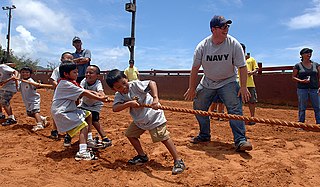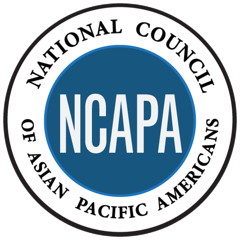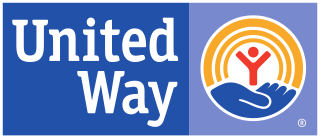
Scouting in Hawaii began in the 1900s. It serves thousands of youth in programs that suit the environment in which they live.
Aloha Airlines was an American airline headquartered in Honolulu, Oahu, Hawaii, operating from a hub at Honolulu International Airport. Operations began on July 26, 1946, and ceased on March 31, 2008.

Hawaiʻi Pacific University, commonly referred to as HPU, is a private, and nonsectarian university in Honolulu and Kaneohe, Hawaiʻi. HPU is the largest private university in the central Pacific, most noted for its diverse student body of nearly 5,000 students, representing nearly 65 countries. The school's top academic programs are in Business Administration, Nursing, Biology, Diplomacy and Military Studies, and Social Work.

The Hawaiian sovereignty movement is a grassroots political and cultural campaign to gain sovereignty, self-determination and self-governance for Hawaiians of whole or part Native Hawaiian ancestry with an autonomous or independent nation or kingdom. Some groups also advocate some form of redress from the United States for the 1893 overthrow of Queen Liliʻuokalani, and for what is described as a prolonged military occupation beginning with the 1898 annexation. The movement generally views both the overthrow and annexation as illegal. Palmyra Island and the Stewart Islands were annexed by the Kingdom in the 1860s and are regarded by the movement as being under illegal occupation along with the Hawaiian Islands. The Apology Resolution passed by the United States Congress in 1993 acknowledged that the overthrow of the Kingdom of Hawaii in 1893 was an illegal act.

Fundraising or fund-raising is the process of gathering voluntary contributions of money or other resources, by requesting donations from individuals, businesses, charitable foundations, or governmental agencies. Although fundraising typically refers to efforts to gather money for non-profit organizations, it is sometimes used to refer to the identification and solicitation of investors or other sources of capital for for-profit enterprises.

The Aloha Festivals are an annual series of free cultural celebrations observed in the state of Hawaii in the United States. It is the only statewide cultural festival in the nation. Highlights include the presentation of the Royal Court, a ho'olaule'a in Waikiki, and the Floral Parade. Approximately 30,000 people volunteer to plan, organize, and provide labor for the Aloha Festivals each year. Their efforts entertain over 1,000,000 people from throughout the state and visitors from all over the world.
Aid effectiveness is the effectiveness of development aid in achieving economic or human development. Following the Cold War in the late 1990s, donor governments and aid agencies began to realize that their many different approaches and requirements for conditioning aid were imposing huge costs on developing countries and making aid less effective. They began working with each other, and with developing countries, to harmonize their work to improve its effect. Aid agencies are always looking for new ways to improve aid effectiveness, including conditionality, capacity building and support for improved governance.
In the United States, a donor-advised fund is a charitable giving vehicle administered by a public charity created to manage charitable donations on behalf of organizations, families, or individuals. To participate in a donor-advised fund, a donating individual or organization opens an account in the fund and deposits cash, securities, or other financial instruments. They surrender ownership of anything they put in the fund, but retain advisory privileges over how their account is invested, and how it distributes money to charities.
Richard W. "Ric" Weiland was a computer software pioneer, programmer and philanthropist. He was the second employee at Microsoft Corporation, joining the company during his final year at Stanford University. At 35, he left Microsoft to focus his time on investment management and philanthropy, becoming a quiet but well-respected donor to the LGBTQ social justice movement, the environment, health and human services, and education. After his death, the Chronicle of Philanthropy called Ric's bequest the 11th largest charitable gift in the nation with more than $165 million distributed between 20 nonprofit beneficiaries.
Dee Jay Mailer is the Chief Executive Officer of Kamehameha Schools. She was appointed on January 19, 2004, and now focuses her energies on educating children of Hawaiian ancestry. She is a 1970 graduate of Kamehameha.

The National Council of Asian Pacific Americans (NCAPA) is a coalition of 35 national Asian-Pacific American organizations in the United States. Founded in 1996 and based in Washington D.C., NCAPA seeks to expand the influence of Asian-Pacific Americans in the legislative and legal arenas, and enhance the public's and mass media's awareness and sensitivity to Asian-Pacific American concerns.

Honolulu County is a consolidated city–county in the U.S. state of Hawaii. The city–county includes both the city of Honolulu and the rest of the island of Oʻahu, as well as several minor outlying islands, including all of the Northwestern Hawaiian Islands except Midway Atoll.
The Foundation for Excellence is a publicly supported, non-profit organization. FFE's focus is to provide funds for higher education to students in India who are academically gifted and from very low-income families.

Hivos is a development aid organization, headquartered in The Netherlands. Hivos provides financial support to organizations working in Africa, Latin America and Asia, it provides advocacy and it supports knowledge sharing in particular in the field of social change, digital activism and rural innovations.
GlobalGiving is 501(c)(3) non-profit organization based in the United States that provides a global crowdfunding platform for grassroots charitable projects. Since 2002, more than 800,000 donors on GlobalGiving have raised more than $340 million to support more than 20,000 projects in 170 countries.
India Development and Relief Fund (IDRF) is a Maryland, USA-based 501(c) (3) tax exempt, non-profit organization that supports impoverished people in India, Nepal and Sri Lanka. IDRF’s main goal has always been- to put power and not charity in the hands of those in need. It has always striven to break the cycle of poverty by empowering the marginalized people with skills, services and infrastructure in sustainable development. IDRF's programs span all over India from Jammu and Kashmir to Tamil Nadu, and from Gujarat to Arunachal Pradesh, Nepal and more recently Sri Lanka. Since its inception in 1988, IDRF has disbursed $34 million in grants to various developmental programs pertaining to areas like: education, health, women’s empowerment, eco-friendly development, good governance, and disaster relief/rehabilitation.
Noelani Goodyear-Ka'ōpua is a Kanaka Maoli scholar and educator whose work centers on Native Hawaiian social movements, culture-based education, and energy and food politics. In her faculty profile at the University of Hawai'i, Manoa, Goodyear-Ka'ōpua writes, "My academic work is one part of a lifetime commitment to aloha 'āina; politically-engaged loving care for Hawai'i and for Indigenous relationships with place." Goodyear-Ka'ōpua has ancestry in the Maui islands as well as in Southern China and the British Midlands. She has published several books concerning issues related to the Hawaiian sovereignty movement and Native Hawaiian education initiatives. She is also a co-founder of Hālau Kū Māna, a Hawaiian culture-based charter school, which opened in Honolulu in 2001. Goodyear-Ka'ōpua has worked as an associate professor of Political Science at the University of Hawai'i at Manoa since 2007. She currently serves as Professional Secretary and Executive Board Member of the Native American and Indigenous Studies Association.
Dr. Kermit Eady was an American social worker, educator, motivational speaker, activist, and the founder of The Black United Fund of New York.










